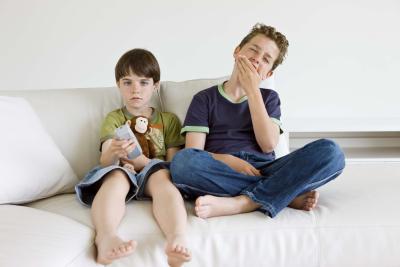Children can get tired quickly, whether from an illness, activity or a sleepless night. Children who are constantly tired for no apparent reason, however, may suffer from chronic tiredness. Children who are tired for more than 10 days should be seen by a doctor, according to BBC Health. These children require medical attention to determine the underlying cause of the seemingly endless fatigue.
Symptoms
Children with chronic tiredness may be tired and irritable. They probably have low energy and may not want to engage in normal daily activities. Some children sleep longer and want to take naps. Many appear depressed and listless. If your child has these symptoms, check for other symptoms too, such as as fever or sore throat. Often, chronic tiredness is caused by an illness.
Causes
Illness can cause chronic tiredness in children, especially glandular fevers, according to BBC Health. Nighttime sleeping problems may also cause chronic tiredness. A noisy sleep environment, siblings who sleep nearby, stress or problems such as sleep apnea can all interfere with a good night’s rest. Allergies and problems in the diet may also cause chronic tiredness, especially if your child has low iron levels in the blood. More serious diseases can also cause chronic tiredness, such as diabetes or cancer.
Prevention
Make sure your child gets enough sleep. Preschoolers and school-aged children need between 11 and 12 hours of sleep per night, according to KidsHealth. Teens need around nine hours of sleep. In addition, make sure your child eats a healthy diet and is getting plenty of iron.
Treatment
Treatment varies depending on the underlying cause of the chronic tiredness. Changes in diet and sleep habits may be required, such as implementing a strict bedtime and creating a soothing bedroom. If the cause of the chronic tiredness is due to an illness, antibiotics or other treatment may be needed. In such cases, there are usually other symptoms such as a fever and rash. If allergies are interfering with a good night’s sleep, remove the allergen or give your child allergy medications. Stress may be also keeping your child up at night. In this case, talk to your child. Find out the cause of the stress and do what you can to reduce it.
Considerations
It’s possible your child might have chronic fatigue syndrome, especially if she is a teenager. Chronic fatigue syndrome is a condition that leaves a person feeling completely exhausted. It is most commonly diagnosed in people over the age of 12 and is twice as common in girls as boys. Accompanying symptoms include headaches, depression, and aches and pains. The specific cause of chronic fatigue syndrome is not known, according to the Children, Youth and Women’s Health Service website. Most people who suffer from chronic fatigue syndrome start to feel normal again after six months to a year.





